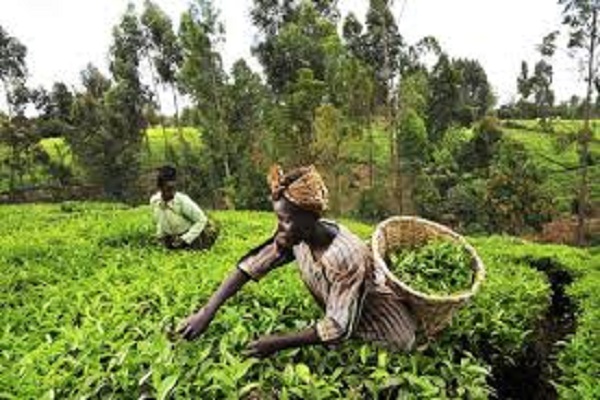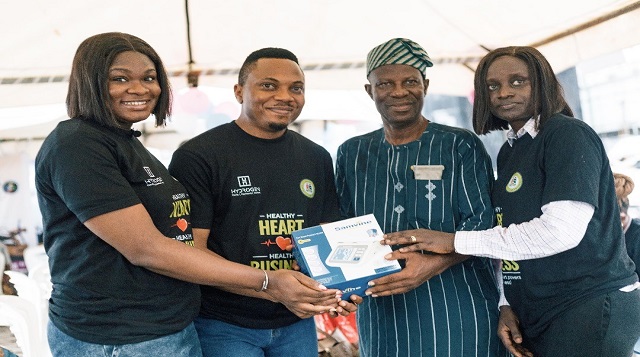General News
NAVSA: Creating A Viable Smart Agriculture For Nigerian Farmers

By Mubarak Umar
One of the major challenges facing Nigeria’s agricultural practices for long is lack of relevant information. The challenges have contribute to inability of farmers to meet the rising demands in foods locally, produce high quality agricultural products that meet international standards, have access to financial security which in turn result into importation of food and other agricultural products, thereby making the sector contributes significantly less to Gross Domestic Product (GDP).

World population is expected to grow by over a third (or 2.5 billion people) by 2050, according to Food and Agriculture Organization of the United Nations. This is much slower rate of growth than seen in the past four decades during which it grew by 3.3 billion people (or more than 90 percent). Nearly all of this growth is forecast to take place in the developing countries. Among the latter, sub-Saharan Africa’s population would grow the fastest with 114%. Urbanization is foreseen to continue at an accelerating pace to account for 70% percent of world population in 2050 (up from 49 percent at present) with rural population, after peaking sometime in the next decade, actually declining.
Global economic growth of about 2.9 percent annually would lead to significant reduction or even near elimination of absolute poverty in the developing countries (persons living on less than US$1.25/day in 2005 prices). Nevertheless, advanced countries have focused on providing the agricultural industry with the infrastructure to leverage emerging technology – including big data, cloud computing and the internet of things (IoT) – for tracking, monitoring, automating and analyzing operations.
However, the untapped potential of Nigerian farmers is currently being unfolded, as Federal Government of Nigeria, through Ministry of Communications and Digital Economy introduced National Adopted Village for Smart Agriculture (NAVSA), to change the face of agric sector in the country.
National Adopted Village for Smart Agriculture being championed by National Information Technology Development Agency (NITDA), is an ecosystem-driven digital platform envisioned for the transformation of the agriculture sector in Nigeria. It is designed to help farmers and other agricultural ecosystem players navigate their journey across the agriculture value chain. This journey cuts across farm production to management, processing, harvesting, storage, marketing and consumption.
It will be a source for quality and updated information that can be accessed and used by different strata of agriculture stakeholders irrespective of their educational background or language at no cost.
The initiative is aimed at facilitating the integration of digital technologies and innovations to improve productivity and income of farmers and other ecosystem players at every step of their journey across the agriculture value chain. This is in a bid to position agriculture as a business and an enterprise that potentially attracts youths and talents to create new values and innovations that come with diverse opportunities which never existed before in the agriculture value chain.
By design, it will create business models and opportunities that would stimulate huge jobs and wealth creation and eventually, economic diversification through agriculture.
The Ministry kick-started NAVSA initiatives late 2019 where 15 and 130 farmers benefited from programme, in Gombe and Jigawa respectively, and other states were also enlisted on NITDA’s chart. Currently, 270 farmers were empowered in Jigawa State, 140 in Ekiti State and also 155 in Gombe state.
Describing the impact of NAVSA on Nigeria’s economy, minister of Communications and Digital Economy, Dr Isa Ali Ibrahim (Pantami), note that the program is one of the policies given to the agencies under the ministry to implement and other agencies will join in the empowerment soon.
NAVSA activities will immensely contribute to the economic growth and employment of the States/local government areas. Partners and Participating States and LGAs are links between the farmers. They provide enabling environment vis-a-vis the existing structure for agriculture at their disposal. Furthermore, they support NAVSA adopted farmers by providing access to land, information, finances and resources and every other thing required for the success of the programme in their respective states/LGAs.
Telecommunications and mobile services are prerequisites to achieve NAVSA strategies. Access to information and other services require smart and web-enabled technologies and mobility services such as call, ussd, sms, ivr, smart devices, internet etc. These services give the beneficiaries access to 2G, 3G and 4G enabled smart devices to guarantee connectivity.
This is to ensure that farmers have access to the best and standard inputs that give rise to improved quality of farm produce. Based on the request, a certain amount of money from each farmer’s seed fund in the digital wallet is disbursed to the input supplier(s) of his/her choice. The inputs items and the amount limit are determined by the calculation in the economics of production for each agriculture production at different stages. Based on each farmer’s request, he/she will be given clearance to collect inputs from the chosen supplier(s).
To enhance financial inclusion and minimise the risk of defaults and mismanagement of funds, all payments go through digital wallets created for farmers through Government licensed digital wallet service providers. Seeds fund allotted to adopted farmers are being disbursed into their digital wallets. Farmers can make requests for payment of inputs and operational related expenses. Two digital wallets have been created for each farmer on the NAVSA platform. They are restricted and unrestricted digital wallets. Farmers in their accounts on the NAVSA platform can view the information on the restricted wallets but they will not be able to access the funds. Access to the funds will go through a request-approval process on NAVSA and third parties digital wallets service providers’ platforms. The request-approval process is to settle farm inputs obligations. Requests must be approved before funds are disbursed.
NAVSA, data-driven digital platform (accessible on the web and mobile app), is expected to facilitate and ease activities of farmers as well as connect all ecosystem players along the agriculture value chain from production to processing and marketing. This will continually create the synergy that contributes to economic development, job and wealth creation.
It contains agriculture-related data and knowledge that can be used by farmers to improve decision making and productivity in food yield and quality. You can also share your knowledge and let’s digitise it for the benefit of farmers.
General News
Uche Uzoebo, SANEF CEO Makes Case for More Financial Inclusion Strategies Targeting Women

Leveraging digital infrastructure is key to accelerating financial inclusion, especially through a multi-stakeholder approach involving governments, fintechs, telecoms, regulators and even the customers.

According to the World Bank report, a significant portion of the global adult population remains unbanked.
Specifically, 27% of adults globally are considered unbanked, and an additional 50% are underbanked, defined as lacking a credit card, , according to Lucidity Insights.
By investing in awareness, robust digital ID systems, interoperable payment rails, and inclusive policy frameworks, stakeholders can expand access to financial services, particularly in underserved regions, and reduce the global unbanked population significantly.
Stakeholders who gathered at the Regtech Conference 2025 discussed these strategies and more, especially facilitating cross-border payments and investment opportunities across Africa.
The event featured a thought-provoking panel discussion moderated by Uche Uzoebo, the Chief Executive Officer (CEO) of Shared Agent Network Expansion Facilities (SANEF) Limited.
The panel discussion themed, “From Borders to Bridges: Leveraging Digital Infrastructure to Drive Financial Inclusion through a Multi-Stakeholder Approach”, brought together diverse voices across banking, fintech, policy, and government to explore how digital infrastructure can be annexed to drive financial inclusion.
Uzoebo highlighted how women often face unique challenges in accessing financial services coupled with limited digital literacy and cultural barriers.
She engaged the panelists to discuss targeted interventions aimed at promoting gender inclusivity in the financial sector and effective financial education programs that empower individuals to utilize digital financial services.
Jacqueline Mpare, Head of Agency Banking, Ecobank Group, highlighted how her organization had established a women-focused initiative to provide support to businesses targeted at women and those with women as part of the leadership by providing them with access to finance and non-financial support.
Isa Aliyushata, Regional Advisor, Africa, Corum Group Limited, stressed the need to inculcate financial literacy into the education curriculum to ensure everyone is exposed to the knowledge of financial literacy from a young age.
The panelists include Ajibade Laolu-Adewale, Chief Partnership & Ecosystems Officer, Wema Bank; Gerald Munyaradzi Nyakwawa, Head of Digital Channels, MoneyMart Finance (Private) Limited, Zimbabwe; Dr. Henry Clarke Kisembo, Group Global Lead and Executive Chairman, Development Associates Link International (DALI); Jacqueline Mpare, Head of Agency Banking, Ecobank Group; Jean Jacques Kajuga, Chief Operations Officer, RSwitch Rwanda; and Isa Aliyushata, Regional Advisor, Africa, Corum Group Limited.
The panelists emphasized collaboration, leading by example, speed and legislative alignment, a unified infrastructure payment system, and collaboration between national and regional switchers to allow a low-cost cross-border payment as key to ensuring financial inclusion.
Meanwhile, her organization, Shared Agency Network Expansion Facilities (SANEF), was honored with the title of 2025 Financial Literacy Champion at the RegTech Awards. This prestigious recognition highlights SANEF’s steadfast commitment to promoting financial literacy and enhancing financial inclusion across Nigeria. Through strategic partnerships, the expansion of agent networks nationwide, and impactful educational programs, SANEF continues to equip millions with the knowledge and tools to make informed financial decisions.
General News
Hydrogen, Lagos State Touch Thousands of Business Owners with “Healthy Heart, Healthy Business” Outreach

As part of its continued effort to support the growth and sustainability of Nigerian enterprises, Hydrogen Payment Services Company Limited joined forces with Ikeja Local Government Area and the Office of the Medical Officer of Health to deliver the impactful “Healthy Heart, Healthy Business” outreach on Wednesday, May 28, 2025, at the Ikeja Local Government Secretariat.

The initiative successfully engaged a wide range of business owners through a combination of in-person participation and extensive digital awareness campaigns.
Participants benefited from a comprehensive range of free medical screenings, including blood pressure checks, ECGs, malaria and typhoid testing, urinalysis, packed cell volume (PCV), blood sugar monitoring, and more, highlighting the critical connection between good health and business longevity.
Kemi Okusanya, CEO of Hydrogen, commented on the initiative, affirming Hydrogen’s passion for the growth of businesses.
“At Hydrogen, we are deeply committed to the success of Nigerian businesses. As a payment solutions provider, we recognise that healthy entrepreneurs build stronger, more resilient enterprises. This outreach exemplifies our belief in supporting entrepreneurs beyond just payments.”
Demonstrating this responsibility, Hydrogen donated Sphygmomanometers and Glucometers to indigent and high-risk attendees unable to afford this essential health monitoring devices, empowering them to manage their health beyond the outreach.
Public-private partnerships (PPPs) have become increasingly important in driving sustainable development across various sectors.
By leveraging the unique strengths of both government institutions and private enterprises, PPPs enable more efficient delivery of services, innovation, and expanded reach. These collaborations foster shared responsibility and resource pooling, making it possible to tackle complex challenges that neither sector could effectively address alone.
Dr. Tawak O.F., Medical Officer of Health for Ikeja, spoke on this, saying, “This partnership with Hydrogen Payment Services Company Limited exemplifies the power of effective public-private collaboration in reaching the heart of our business community.”
“Entrepreneurs often overlook their health while striving for success, but initiatives like this remind us all that good health is an essential part of wealth. We commend Hydrogen for their commitment to not just powering payments, but also powering healthier, more resilient businesses through impactful community engagement,” She added.
Mary, one of the beneficiaries and a merchant in ‘Computer Village’, expressed her gratitude, saying that, “Most of us don’t think about regular hospital checkups. Mainly, because the cost is too high and some things now are not covered by insurance. Today, Hydrogen and Lagos State have brought doctors for free to our doorstep, and we are very grateful.”
Hydrogen’s full team presence at the event reaffirmed the company’s dedication to forging genuine relationships and standing firmly with the business communities it serves.
General News
Tripoint Travels Hosts Pre-GEC Brunch for Nigerian Delegates Ahead of Global Entrepreneurship Congress 2025

In a vibrant celebration of national pride, global relevance, and entrepreneurial drive, Tripoint Travels, the official logistics partner of GEN Nigeria hosted an exclusive pre-congress brunch for Nigerian delegates attending the upcoming Global Entrepreneurship Congress (GEC) 2025.

Held at Tripoint’s Lagos headquarters, the event brought together top entrepreneurs, investors, ecosystem leaders, and government officials, including Dr. Peter Bamkole, Deputy Vice Chancellor, Pan Atlantic University; Dr. Olawale Anifowose, Managing Director of the Global Entrepreneurship Congress Nigeria (GEN Nigeria); Dr. Babangida Ruma from The Katsina State Enterprise Development Agency (KASEDA), Mrs. Uche Uzoebo, CEO of the Shared Agent Network Expansion Facilities (SANEF) Limited; Actor and influencer Mr. Umar Gombe; along with other distinguished guests and representatives from various government bodies, all in anticipation of their journey to Indianapolis, Indiana this June.
The Global Entrepreneurship Congress (GEC), Organized annually by the Global Entrepreneurship Network (GEN), the GEC brings together more than 5,000 participants from over 200 countries, including Entrepreneurs, Investors, Policymakers, Researchers, & Support organizations to build stronger entrepreneurial ecosystems worldwide. Since its inception in 2009, the GEC has become a cornerstone of international collaboration and entrepreneurial innovation.
This year’s GEC, hosted in partnership with the Indiana Economic Development Corporation (IEDC), marks the Congress’ return to the United States after 16 years. Held in Indianapolis from June 2–5, 2025, the event aims to spotlight Indiana’s pro-growth business climate while strengthening global ties that promote sustainable economic development and innovation.
The brunch allowed the delegation to connect in an intimate and engaging setting, sharing expectations, ideas, and goals ahead of one of the most impactful convening in the global entrepreneurship calendar. Designed to build camaraderie, align visions, and foster a sense of shared identity, the event emphasized the importance of collaboration as Nigerian representatives prepare to take the global stage.
“The Global Entrepreneurship Congress is not just a conference, it’s a platform that is deliberate about global innovation meeting local action, said Mrs. Shuhda Muhammed, Founder of Tripoint Travels. We wanted to set the tone for our delegates, to ensure that they feel connected to this year’s theme – The Bold Change the World, as well as foster the necessary collaborations to make that happen at the local and global stage.. As a company rooted in both logistics and empowerment, we are proud to play a role in making their journey seamless and meaningful.”
Speaking at the event, Dr. Olawale Anifowose, Managing Director of the Global Entrepreneurship Network Nigeria (GEN Nigeria), emphasized the significance of the Global Entrepreneurship Congress (GEC) as both a meeting point and a growth platform, where Nigerian entrepreneurs engage with global ecosystems to connect, learn, and thrive. He noted that Nigeria’s presence at the GEC is not just symbolic but essential, reflecting the country’s growing influence in the global entrepreneurial landscape. Dr. Anifowose also commended Tripoint Travels for their pivotal role as a trusted partner in mobilizing Nigeria’s brightest talent and making the journey to GEC 2025 a reality.
GEN Nigeria has emerged as a critical force in supporting entrepreneurship at the grassroots and policy level, and with a Partner as Tripoint Travels, its expansive network and initiatives, continues to actively shape the country’s innovation landscape, championing inclusive growth, and equipping thousands of Entrepreneurs with the tools, exposure, and networks needed to succeed in both local and international markets.
With delegates selected for their contributions to Ecosystem building and Entrepreneurship, Nigeria’s representation at The GEC 2025 would reflect the country’s diversity, resilience, entrepreneurship spirit and creative potential. The presence of Founders and Innovators like Mr Rotimi Awofisibe – MD, VFD bank, one of the officially invited participants, is testament to Nigeria’s growing influence in the Global Entrepreneurship arena.
“We’re proud to be a longstanding partner of GEN Nigeria, supporting the Entrepreneurs shaping Nigeria’s future. Attending the Global Entrepreneurship Congress (GEC) is about learning, contributing, and returning with a renewed, broader vision. It’s through committed partnerships like ours that such visions become reality,” said Mrs. Muhammed.
More than just a travel management company, Tripoint Travels is a trusted enabler of dreams, mobility, and opportunity. As GEN Nigeria’s official travel partner for GEC 2025, Tripoint is overseeing every aspect of the delegation’s journey, from visa coordination and flight logistics to accommodation and ground transportation, ensuring a seamless and empowering experience.
Tripoint Travels also extends its commitment to ecosystem development through Tripoint Academy, its nonprofit arm that supports early-stage entrepreneurs with training, mentoring, and access to local and global opportunities. Tripoint’s partnership with GEN Nigeria reflects its broader mission: to use travel as a tool for empowerment, education, and national development.
“Every single ticket we issue is a bridge, a bridge between where someone is now, and where they’re meant to be,” added Mrs. Muhammed. “We don’t just book travel. We open up the world for Nigerian entrepreneurs.”
The highlight of the Pre-Congress brunch was the piece of art done by all the delegates present at the event. The interactive art was introduced as an inclusive way to showcase the multiculturalism and pivotal position of the Nigerian business mind, and so the essence of the Nigerian delegation materialised through the painting. The art work will be exhibited and gifted at a special event during the Congress.

 Telecom3 days ago
Telecom3 days agoMTN Nigeria Invests ₦900Bn in 2025 to Boost Network Quality in Lagos & Abuja

 E-Business3 days ago
E-Business3 days agoFirm Reports a 48% Increase in Malicious Packages Threatening Software Supply Chains

 News3 days ago
News3 days agoEFCC Witness Admits Writing Off Arik Air’s $2.3M Debt Amid N76Bn Fraud Trial

 Telecom3 days ago
Telecom3 days agoMTN Nigeria Wins Award for Best Use of Data @MarkHack 4.0 Awards Night

 Telecom2 days ago
Telecom2 days agoGlo, Huawei, Communications Ministry Bring Digital Services to Abuja Village

 News3 days ago
News3 days agoSERAP Urges National Assembly to Reject Tinubu’s $24Bn Loan Request Over Debt Concerns

 E-Financial3 days ago
E-Financial3 days agoSenate Passes Harmonised Report on Tax Reform Bills

 Broadcasting3 days ago
Broadcasting3 days agoThe Rave Revolution: How Gen Z and EDM Are Rewriting Nigeria’s Nightlife
















